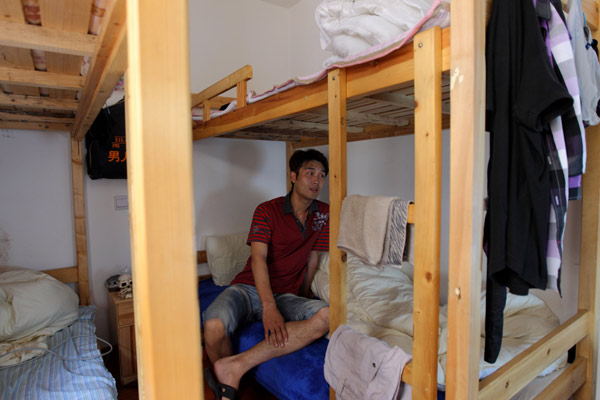Society
Hostels provide refuge for city job seekers
Updated: 2011-07-05 08:00
By Yu Ran (China Daily)
Sharing a double bed with a roommate in a 20-square-meter bedroom, Ma Chao is quite satisfied with his living conditions.
A year ago Ma lived with another person in a 7-sq-m room, sharing a bathroom with more than 20 people. He had difficulty finding work and earning money, so he slept in a job hostel.
|
 Wei is staying in a small job hostel on North Zhongshan Road in Shanghai. He arrived a week ago from Shenzhen, Guangdong province. [Gao Erqiang / China Daily] |
"We rarely stayed in the room, which was only enough to put a bunk bed and a desk in," said Ma, 24, now a salesman at a chemical company. "We chose to live in this kind of accommodation because it costs about 30 yuan ($4.60) a day, which is very cheap in Shanghai."
Ma was born in Yancheng, Jiangsu province, and graduated from Wuhan Textile University, majoring in English. He came to Shanghai last year, looking for a job.
He and other migrants like him found the job hunt trying, and they needed financial support from their parents from time to time. "One evening we only had 10 yuan left altogether and we had to buy and share a few steamed buns for our dinner."
Where to live at the lowest cost is the first and biggest problem for newly arrived, unemployed migrants. Youth hostels specially designed for young job seekers fill the bill for many.
Most rental properties require tenants to pay at least one month's rent as a deposit, sign a one-year lease and give a month's notice before moving out. Job hostels allow residents to check in or out without notice, and fees are charged at a daily rate.
|
 Mi, who comes from Tianjin, watches TV in this four-bed room. He has stayed in the hostel, for 20 yuan a day, since he arrived in Shanghai three months ago. [Gao Erqiang / China Daily]
|
"We aim to provide convenience and assistance to enable new graduates who come to Shanghai for jobs to check in and out anytime they want, as a combination of hostel and rental apartment," said Tong Xianjin, owner of Bai Yuan Job Hostel. He opened the first of his five hostels in Shanghai four years ago.
"The occupancy rate of our rooms averages 80 to 90 percent," Tong said, "with more students coming between June and August, the peak of graduation season, and staying up to half a year before moving out to live nearer to where they work."
Diploma check
The job hostel concept was introduced to China in 2006, when the booming real estate market pushed prices out of most job seekers' range.
"Different types of rooms are available, from single room, double room to quadruple room, a room for six people and eight people, with prices from 10 yuan to 80 yuan a day, " Tong said.
As at traditional hostels, shared bathrooms and kitchen are available for up to 20 residents. At these hostels, tenants have to show their college diplomas before checking in.
In its latest report, in February, the State Department of Human Resources and Social Security forecast that more than 6.5 million college graduates would rush to job fairs in June and August along with senior high or junior school graduates who quit school, laid-off urban workers and retired soldiers. They would total 24 million job seekers - competing for 12 million jobs.
Cheaper but illegal
A different type of competition has emerged - from lower-cost job hostels opened without certification in standard residential apartments. Xiao Ning, 25, lived in one for a few months to save money.
"It was a three-bedroom apartment with two bathrooms, a tiny kitchen and a living room that was shared by almost 30 male migrant workers," Xiao said. He spent his first two months in Shanghai sleeping in a six-bunk bedroom in the 200-square-meter apartment for 10 yuan a day.
A graduate of Hubei University of Economics, Xiao arrived in Shanghai in April 2010 looking for internships and found a job in the third month. He is a buyer for a local chain supermarket.
"It was too hard and too expensive to find a job in Shanghai, especially for those students like me who did not graduate from a branded university. It left me no choice but to squeeze myself into an extremely crowded place in the beginning."
Xiao said many apartments in the neighborhood were being used as job hostels. Most had white walls, concrete floors and the cheapest wooden beds.
It took him three months after being hired to find the right place, and he now lives alone in a more appealing one-bedroom apartment. He just paid off the money he had borrowed from friends over Spring Festival because he hadn't wanted to ask for more money from his parents, who live in the countryside of Anhui province.
E-paper

Shining through
Chinese fireworks overcome cloudy times, pin hopes on burgeoning domestic demand
Pen mightier than the sword
Stroke of luck
Romance by the sea
Specials

90th anniversary of the CPC
The Party has been leading the country and people to prosperity.

My China story
Foreign readers are invited to share your China stories.

Green makeover
Cleanup of Xi'an wasteland pays off for ancient city
